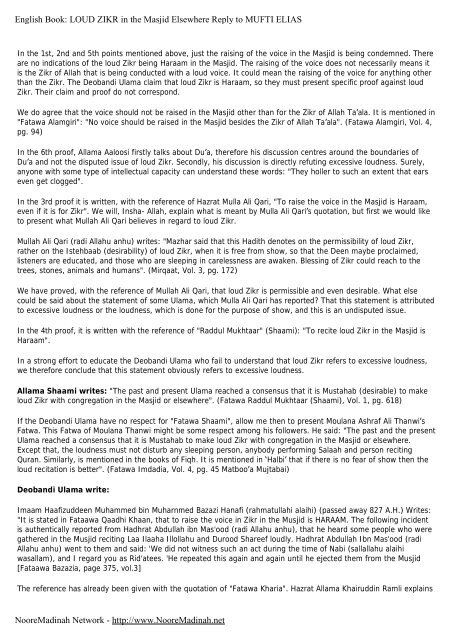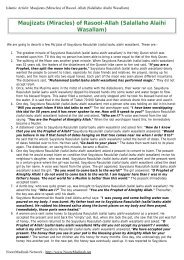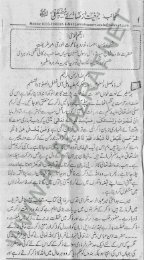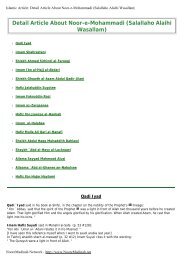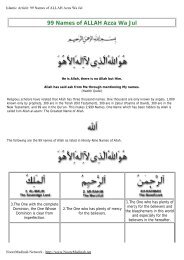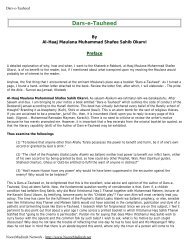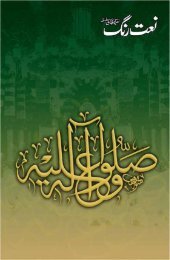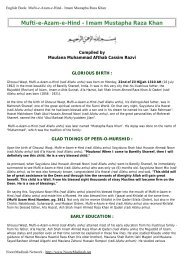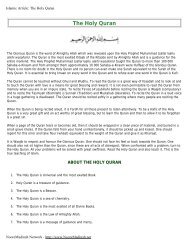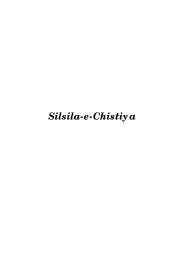LOUD ZIKR in the Masjid & Elsewhere & Reply to MUFTI ELIAS
LOUD ZIKR in the Masjid & Elsewhere & Reply to MUFTI ELIAS
LOUD ZIKR in the Masjid & Elsewhere & Reply to MUFTI ELIAS
Create successful ePaper yourself
Turn your PDF publications into a flip-book with our unique Google optimized e-Paper software.
English Book: <strong>LOUD</strong> <strong>ZIKR</strong> <strong>in</strong> <strong>the</strong> <strong>Masjid</strong> <strong>Elsewhere</strong> <strong>Reply</strong> <strong>to</strong> <strong>MUFTI</strong> <strong>ELIAS</strong><br />
In <strong>the</strong> 1st, 2nd and 5th po<strong>in</strong>ts mentioned above, just <strong>the</strong> rais<strong>in</strong>g of <strong>the</strong> voice <strong>in</strong> <strong>the</strong> <strong>Masjid</strong> is be<strong>in</strong>g condemned. There<br />
are no <strong>in</strong>dications of <strong>the</strong> loud Zikr be<strong>in</strong>g Haraam <strong>in</strong> <strong>the</strong> <strong>Masjid</strong>. The rais<strong>in</strong>g of <strong>the</strong> voice does not necessarily means it<br />
is <strong>the</strong> Zikr of Allah that is be<strong>in</strong>g conducted with a loud voice. It could mean <strong>the</strong> rais<strong>in</strong>g of <strong>the</strong> voice for anyth<strong>in</strong>g o<strong>the</strong>r<br />
than <strong>the</strong> Zikr. The Deobandi Ulama claim that loud Zikr is Haraam, so <strong>the</strong>y must present specific proof aga<strong>in</strong>st loud<br />
Zikr. Their claim and proof do not correspond.<br />
We do agree that <strong>the</strong> voice should not be raised <strong>in</strong> <strong>the</strong> <strong>Masjid</strong> o<strong>the</strong>r than for <strong>the</strong> Zikr of Allah Ta’ala. It is mentioned <strong>in</strong><br />
"Fatawa Alamgiri": "No voice should be raised <strong>in</strong> <strong>the</strong> <strong>Masjid</strong> besides <strong>the</strong> Zikr of Allah Ta’ala". (Fatawa Alamgiri, Vol. 4,<br />
pg. 94)<br />
In <strong>the</strong> 6th proof, Allama Aaloosi firstly talks about Du’a, <strong>the</strong>refore his discussion centres around <strong>the</strong> boundaries of<br />
Du’a and not <strong>the</strong> disputed issue of loud Zikr. Secondly, his discussion is directly refut<strong>in</strong>g excessive loudness. Surely,<br />
anyone with some type of <strong>in</strong>tellectual capacity can understand <strong>the</strong>se words: "They holler <strong>to</strong> such an extent that ears<br />
even get clogged".<br />
In <strong>the</strong> 3rd proof it is written, with <strong>the</strong> reference of Hazrat Mulla Ali Qari, "To raise <strong>the</strong> voice <strong>in</strong> <strong>the</strong> <strong>Masjid</strong> is Haraam,<br />
even if it is for Zikr". We will, Insha- Allah, expla<strong>in</strong> what is meant by Mulla Ali Qari’s quotation, but first we would like<br />
<strong>to</strong> present what Mullah Ali Qari believes <strong>in</strong> regard <strong>to</strong> loud Zikr.<br />
Mullah Ali Qari (radi Allahu anhu) writes: "Mazhar said that this Hadith denotes on <strong>the</strong> permissibility of loud Zikr,<br />
ra<strong>the</strong>r on <strong>the</strong> Istehbaab (desirability) of loud Zikr, when it is free from show, so that <strong>the</strong> Deen maybe proclaimed,<br />
listeners are educated, and those who are sleep<strong>in</strong>g <strong>in</strong> carelessness are awaken. Bless<strong>in</strong>g of Zikr could reach <strong>to</strong> <strong>the</strong><br />
trees, s<strong>to</strong>nes, animals and humans". (Mirqaat, Vol. 3, pg. 172)<br />
We have proved, with <strong>the</strong> reference of Mullah Ali Qari, that loud Zikr is permissible and even desirable. What else<br />
could be said about <strong>the</strong> statement of some Ulama, which Mulla Ali Qari has reported? That this statement is attributed<br />
<strong>to</strong> excessive loudness or <strong>the</strong> loudness, which is done for <strong>the</strong> purpose of show, and this is an undisputed issue.<br />
In <strong>the</strong> 4th proof, it is written with <strong>the</strong> reference of "Raddul Mukhtaar" (Shaami): "To recite loud Zikr <strong>in</strong> <strong>the</strong> <strong>Masjid</strong> is<br />
Haraam".<br />
In a strong effort <strong>to</strong> educate <strong>the</strong> Deobandi Ulama who fail <strong>to</strong> understand that loud Zikr refers <strong>to</strong> excessive loudness,<br />
we <strong>the</strong>refore conclude that this statement obviously refers <strong>to</strong> excessive loudness.<br />
Allama Shaami writes: "The past and present Ulama reached a consensus that it is Mustahab (desirable) <strong>to</strong> make<br />
loud Zikr with congregation <strong>in</strong> <strong>the</strong> <strong>Masjid</strong> or elsewhere". (Fatawa Raddul Mukhtaar (Shaami), Vol. 1, pg. 618)<br />
If <strong>the</strong> Deobandi Ulama have no respect for "Fatawa Shaami", allow me <strong>the</strong>n <strong>to</strong> present Moulana Ashraf Ali Thanwi’s<br />
Fatwa. This Fatwa of Moulana Thanwi might be some respect among his followers. He said: "The past and <strong>the</strong> present<br />
Ulama reached a consensus that it is Mustahab <strong>to</strong> make loud Zikr with congregation <strong>in</strong> <strong>the</strong> <strong>Masjid</strong> or elsewhere.<br />
Except that, <strong>the</strong> loudness must not disturb any sleep<strong>in</strong>g person, anybody perform<strong>in</strong>g Salaah and person recit<strong>in</strong>g<br />
Quran. Similarly, is mentioned <strong>in</strong> <strong>the</strong> books of Fiqh. It is mentioned <strong>in</strong> ‘Halbi’ that if <strong>the</strong>re is no fear of show <strong>the</strong>n <strong>the</strong><br />
loud recitation is better". (Fatawa Imdadia, Vol. 4, pg. 45 Matboo’a Mujtabai)<br />
Deobandi Ulama write:<br />
Imaam Haafizuddeen Muhammed b<strong>in</strong> Muharnmed Bazazi Hanafi (rahmatullahi alaihi) (passed away 827 A.H.) Writes:<br />
"It is stated <strong>in</strong> Fataawa Qaadhi Khaan, that <strong>to</strong> raise <strong>the</strong> voice <strong>in</strong> Zikr <strong>in</strong> <strong>the</strong> Musjid is HARAAM. The follow<strong>in</strong>g <strong>in</strong>cident<br />
is au<strong>the</strong>ntically reported from Hadhrat Abdullah ibn Mas'ood (radi Allahu anhu), that he heard some people who were<br />
ga<strong>the</strong>red <strong>in</strong> <strong>the</strong> Musjid recit<strong>in</strong>g Laa Ilaaha Illollahu and Durood Shareef loudly. Hadhrat Abdullah Ibn Mas'ood (radi<br />
Allahu anhu) went <strong>to</strong> <strong>the</strong>m and said: 'We did not witness such an act dur<strong>in</strong>g <strong>the</strong> time of Nabi (sallallahu alaihi<br />
wasallam), and I regard you as Rid'atees. 'He repeated this aga<strong>in</strong> and aga<strong>in</strong> until he ejected <strong>the</strong>m from <strong>the</strong> Musjid<br />
[Fataawa Bazazia, page 375, vol.3]<br />
The reference has already been given with <strong>the</strong> quotation of "Fatawa Kharia". Hazrat Allama Khairudd<strong>in</strong> Ramli expla<strong>in</strong>s<br />
NooreMad<strong>in</strong>ah Network - http://www.NooreMad<strong>in</strong>ah.net


